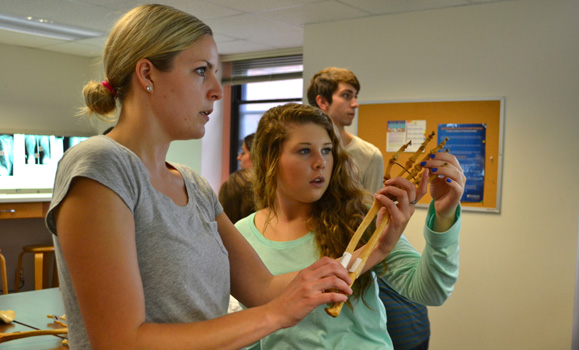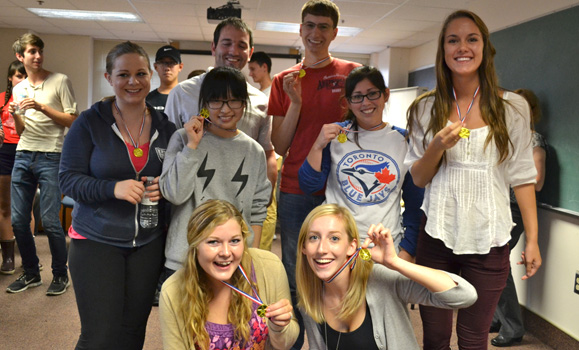Wickwire Field isnÔÇÖt the only place youÔÇÖll see pilipili┬■╗ş teams pulling together.
Last month, The School of Health Sciences encouraged teamwork in health care with the Interprofessional Health Education (IPHE) Championships. It was the second-annual Olympic-style competition, which acts as both a first-year student meet-and-greet and an introduction to the five health disciplines within the school.
A case for holistic care
Barbara MacDonald, faculty member in the School of Health Sciences and third-year advisor, along with Leslie Hill, professor of diagnostic cytology, created the IPHE Championships last year in order to provide a fun and competitive way for first-year students from the five different Bachelor of Health Science disciplines to meet one another.
ÔÇťWe were looking to do something with the first-year students fairly early on in the fall academic term as a way for students to get to know each other, learn about, from and with one another,ÔÇŁ says MacDonald.
The five BHSc disciplines include diagnostic cytology, diagnostic medical ultrasound, nuclear medicine, radiological technology and respiratory therapy. Teams were composed of students from each of the five disciplines who worked together to complete tasks representative of the different health professions.
ÔÇťIt is imperative for health-care students to realize that effective patient care requires collaboration as an interprofessional team,ÔÇŁ says MacDonald. ÔÇťSo for our students we thought that this sense of holistic care must start from the beginning.ÔÇŁ
A competition for future professionals
Faculty representatives from each discipline designed the individual activities for the IHPE Championships, and students raced to beat the clock as they moved from classroom to classroom with a ten-minute time limit in each.
In the nuclear medicine classroom, teams spilt into two groups. One group tackled dressing a team member in the appropriate garb of a radiopharmacy technologist, while the other used a meter to search for five radioactive sources in the room.

For the ultrasound portion of the competition, students were required to identify organs and structures on the ultrasound monitor and count cysts and tumors in a breast phantom. Students played ÔÇťI Spy with my Cytology EyeÔÇŁ for another activity and practiced their diagnostic skills by examining microscope scans for benign forms and abnormalities, while, in radiological technology, teams worked quickly to match bones to x-ray images.
Finally, for the respiratory therapy portion of the competition, teams first labeled respiratory equipment correctly before saving the life of Jake ÔÇťthe tracheÔÇŁ by setting up an air entrainment mask.
At the medal ceremony following the competition, first-year respiratory therapy student and winning team member Alicia dÔÇÖEon said the event was a useful exercise.
ÔÇťWe got to work with others, which is cool because that is what we do in real life.ÔÇŁ
Collaboration for a cause
The IPHE Championships will not be the last time the health sciences students get to collaborate. Other events scheduled for the year include a professionalism workshop in March, along with interprofessional opportunities during first-year clinical practicums.
Carol Gillis, acting director of the School of Health Sciences, explains that students must participate in at least two interprofessional educational experiences outside of their discipline each year during their four-year degree.
ÔÇťHaving five health disciplines in one school, the students learn right away from, with and about the others,ÔÇŁ she says, adding that teamwork is necessary to offer the best possible health care.
In November, students from the School of Health Sciences will get to take their teamwork skills further and collaborate with students from other health faculties such as medicine and dentistry to support a chosen charity at the ÔÇťFor the Health of ItÔÇŁ fundraising event.
Held at the Dalhousie Arts Centre, the event has been an annual event for over 30 years now, benefitting a different charity each year. Funds are raised by selling tickets for an evening of entertainment put on by the students, who perform skits that are judged in multiple categories.
The event provides another occasion for health professions students to interact with peers from numerous health-care specialties.
ÔÇťInterprofessionalism today is collaboration, learning with, from and about each other, recognizing the contributions that each profession brings to patient-centred care and teamwork,ÔÇŁ says MacDonald. ÔÇťThe common goal is the best care for the patient in an efficient and effective manner."


